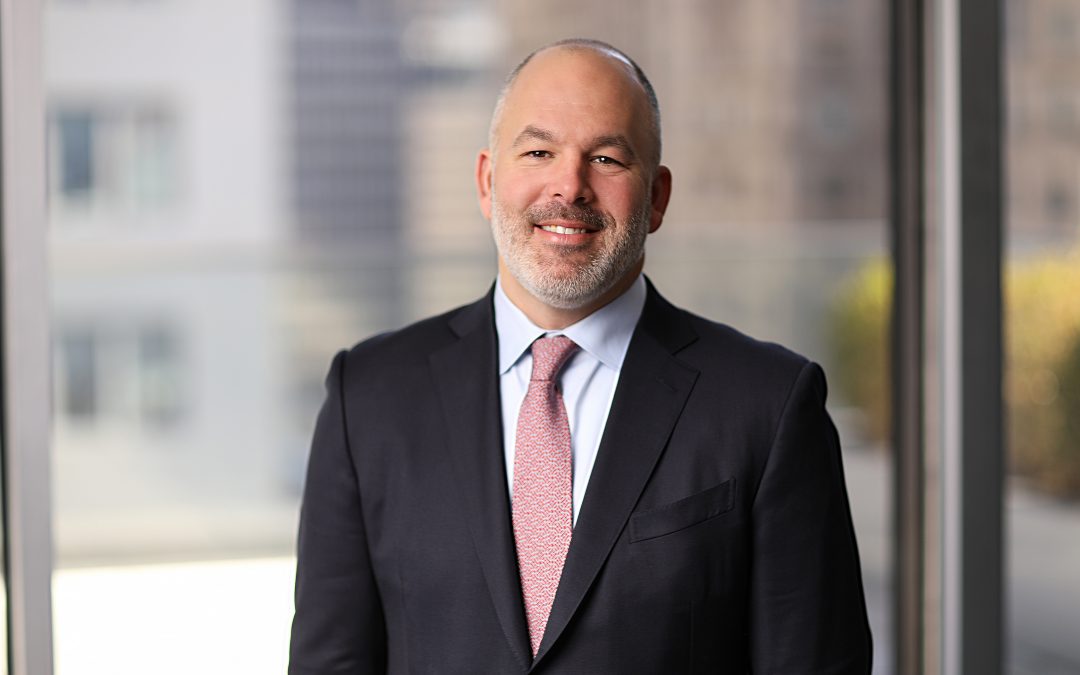Solving the real estate puzzle
Nuveen’s Global Head of Real Estate Chris McGibbon (MBA ’01) is always looking for the next piece that will build great results for his clients.
For his first three years as an undergraduate student at the University of Maryland, Chris McGibbon (MBA ’01) thought following in his father’s footsteps into a career in chemistry was a stable path to follow. An internship experience with a major paint company that was as boring as watching paint dry – literally, he once had to watch paint dry for a specific project – made him rethink his decision to major in chemistry.
In switching to business and focusing on real estate, McGibbon would ultimately find a field that has continued to pique his interest for more than two decades.
Understanding that he needed more stimulation in his daily work, while still an undergraduate student, McGibbon answered a newspaper ad for a project manager role with a real estate developer. Ready to impress his bosses, McGibbon came dressed in business wear to a job site. As it would turn out, the “project manager” position was really a laborer, performing tasks like setting foundation, framing walls and everything else in between needed to build a structure.
“It ended up being great because I got to do all of the ground-level work of building, but I also got to sit in the sales trailer on weekends and chat about people buying homes,” he recalled. “Those experiences made me realize how much I loved [real estate], and how I could constantly solve problems.”
For McGibbon, real estate is like a challenging puzzle – with consistent effort and persistence fitting all the pieces together, you can build something great.
With his sights set on a career in real estate, McGibbon returned to where he grew up in South Florida for his first real suit-and-tie job with Jorge Perez’ The Related Group as an assistant program manager.
“We used to call working with Jorge, ‘The University of Jorge Perez,’” McGibbon joked. “You were given responsibility early on and you had to learn along the way, and that taught me so much.”
After time at The Related Group, McGibbon moved to Codina Development Corporation where he focused on project management from beginning to end – entitlements, permitting, construction and sales. While Codina expanded his experience with developing real estate assets, McGibbon was intrigued to learn more about the industry as a whole.
“You’d see these people come in and purchase assets for $30 million, and that was when I realized there was more to know about the industry,” he recalled.
Already in Florida, McGibbon made the easy choice to attend the University of Florida to earn his MBA. After a fast-paced year in the program, McGibbon came out with a job offer from TIAA.
At the time, much of the major real estate assets were owned by life insurance companies, McGibbon explained. With this role, he’d be working with real estate investments that helped fund the retirement plans of hard-working teachers, police officers, firefighters, and the like.
Throughout his 23 years with TIAA, McGibbon has served in roles on both the debt and equity side, starting out lending to large property groups and later moving into acquisitions.
McGibbon’s roles have consistently included travel across the nation and world. After realizing how critical it was to have boots on the ground when evaluating properties, he led the New York-based company’s efforts to open its first office in California. What started out as two offices in the nation has grown into 30 worldwide.
With those offices has come the opportunity to acquire $150 billion in assets, managed under Nuveen, a TIAA Company since 2015, where McGibbon serves as Global Head of Real Estate.
“From a career perspective, [I wouldn’t be in this role] if I wouldn’t have put my hand up when nobody else would,” McGibbon said. “Doing so gave me the experience I needed to grow and learn in my career and get me to where I’m at today.”
In leading Nuveen’s global real estate efforts, McGibbon noted that staying ahead of the curve is critical to the ever-changing real estate landscape. For a time, the major real estate sectors were focused on office, retail, industrial, and housing, he explained. Now, in a post-pandemic world, office space is less critical, in-person retail is back, affordable housing is in demand, and expanded sectors like hospitality, healthcare and storage have emerged.
In understanding the macro trends, McGibbon is in a better position to deliver returns to investors.
“If you have the compass pointed right and get above average returns, then you’ve hit a home run [for your clients],” he said. “Figuring out that puzzle and understanding the ‘next sector’ is both the biggest challenge and the most interesting.”
While McGibbon’s years of experience have helped him understand the need to pivot as the industry does, he’s keen on letting the next generation take a turn in the driver’s seat.
“I know less of the answers at 51 than I did at 28, and I am perfectly ok with that,” he said. “The last thing I want is later-career people setting where the world is going tomorrow when young people have a better grasp on that. I’m a believer in servant leadership and getting smart people into roles and letting them own their results.
“Empowering young people to take the lead has allowed us to stay ahead of the game.”
McGibbon’s servant leadership mentality has also empowered students at the University of Florida. Through his 10-year involvement with the Kelley A. Bergstrom Real Estate Center, McGibbon has mentored Business Gators looking for insights and opportunities to grow in their careers.
“UF has a really great real estate program,” McGibbon noted. “When I was in school, it wasn’t that common to have a real estate program, but I’ve seen it grow and the students succeed. Anytime I see someone from UF reach out, I always pause and see what I can do to help.”
While McGibbon has a number of insights for young professionals, among the most critical is one that he employed in his own career – think about your career as a learning marathon, not a sprint.
“So many young people come into the business interested in a quick promotion, but think about it as being a learner first,” he advised. “You achieve the best [results] when you stay disciplined and become a master of your craft. Put in enough time in order to get the most out of every step [in your career], then you can speak with your merit and your results.”




